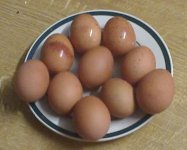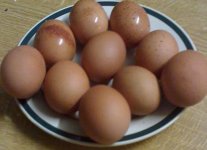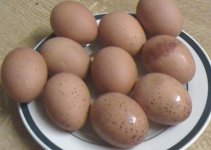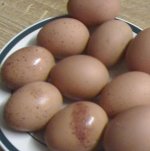A
Anonymous
Guest
Hello all
Just been chatting to Lydia and I was describing my hens eggs as having some speckles on, she said to wash them to see if they come off as it may be a sign of red mite.
I washed the eggs, none of the speckles washed off or even came off with one of those sponge pan scourer things, but some of the speckles came off after I scraped them with my nails. It looked as though part of the shell was coming off as well and the darker speckles are slightly raised up from the rest of the shell. The lighter speckles on the other eggs just look like freckles and part of the egg colouring. Most of the eggs have random speckles but one has a distinct dark patch on it. Ringo is the only big hen laying at the moment and seems quite happy and healthy and she is eating well.
Mrs Bantam is still laying well and shows no signs of ill health or being infested with anything other than occasionally being picked on by the ninja hen.
None of the other hens appear unwell.
I have some diatom which I'll put in their food, bedding and on them starting from tomorrow just to be sure and give their houses an extra good srcub out. I have garlic granules which I add to their food and I should get some wages tomorrow so I'll fork out for some ACV as well.
I've added some pics of my eggs, they're not the clearest as I used my camera phone. I can't tell you the colour of the speckles due to being colour blind and I only know that the eggs are brown because I was told that welsummers lay brown eggs and they're not the ordinary light egg shell colour I'm used to seeing.
Any help, comments, advice would be greatly appreciated.
Thanks for the tip Lydia, it never occured to me that my hens might be infested. I'm
fairly sure they're okay but there's nowt wrong with being thorough!
Osric
Just been chatting to Lydia and I was describing my hens eggs as having some speckles on, she said to wash them to see if they come off as it may be a sign of red mite.
I washed the eggs, none of the speckles washed off or even came off with one of those sponge pan scourer things, but some of the speckles came off after I scraped them with my nails. It looked as though part of the shell was coming off as well and the darker speckles are slightly raised up from the rest of the shell. The lighter speckles on the other eggs just look like freckles and part of the egg colouring. Most of the eggs have random speckles but one has a distinct dark patch on it. Ringo is the only big hen laying at the moment and seems quite happy and healthy and she is eating well.
Mrs Bantam is still laying well and shows no signs of ill health or being infested with anything other than occasionally being picked on by the ninja hen.
None of the other hens appear unwell.
I have some diatom which I'll put in their food, bedding and on them starting from tomorrow just to be sure and give their houses an extra good srcub out. I have garlic granules which I add to their food and I should get some wages tomorrow so I'll fork out for some ACV as well.
I've added some pics of my eggs, they're not the clearest as I used my camera phone. I can't tell you the colour of the speckles due to being colour blind and I only know that the eggs are brown because I was told that welsummers lay brown eggs and they're not the ordinary light egg shell colour I'm used to seeing.
Any help, comments, advice would be greatly appreciated.
Thanks for the tip Lydia, it never occured to me that my hens might be infested. I'm
fairly sure they're okay but there's nowt wrong with being thorough!
Osric




